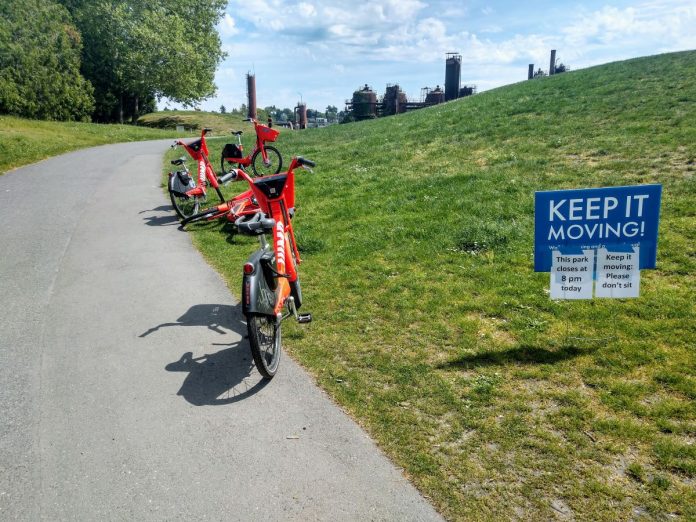Seattle once again finds itself without bikeshare. On Friday, Uber pulled the plug on its JUMP app after hitching its bike wagon to its competitor Lime in a deal worth $170 million. The Uber-led investment was not quite enough to pose a majority stake in Lime, which was recently valued at $510 million–but it was close after Lime’s value plummeted 80% in the past year.
JUMP bikes are still strewn around town, but they are not available on the app, which is being put out to pasture.
Backed by gobs of venture capital, private bikeshare had a meteoric rise–so too has been its fall. Private bikeshare launched in Seattle in 2017 and already Spin, ofo, Lime, and now JUMP have all come and went. Lime, for its part, is promising to relaunch, but it may opt to go with only scooters when that happens.
Lime’s Director of Strategic Development for the Northwest Jonathan Hopkins reassured the Seattle biking community that the fleet would be back.
“They’ll be back as soon as we can, with the fleet Seattleites have become used to,” Hopkins said in a tweet. “Unlike airline mergers where prep is done for years in advance, this integration had to happen in real time. We are committed to multimodal service of the city and [getting] them back on the street soon.”
While the pandemic may share some of the blame in this latest shakeup, Seattle has had a hard time finding a bikeshare model that clicks. The Seattle City Council abandoned the city’s publicly-owned dock-based Pronto Cycle Share and cleared the way for a rotating cast of private bikeshare operators.
Lime rose to dominate Seattle’s bikeshare market before JUMP burst onto the scene and turned the tables with zippier and more dependable e-bikes. JUMP became the only bikeshare operator at the end of 2019. 2019, by the way, saw 2.2 million bikeshare rides in Seattle–averaging more than 6,000 per day.
2020 is a different story and that momentum is very much at risk. Scootershare was meant to launch this spring before COVID-19 disrupted those plans and some companies had said they were waiting for scootershare to jump in the game. The pandemic has sapped demand, but as things ramp back up, bikeshare could be more attractive than riding the bus or train for many people since it’s an open air individual activity.
If e-bikes are in Lime’s plans, it’s not clear which model they’ll use. Lime bikes developed a reputation for disrepair, whereas JUMP used a sturdier Bewegen model. One certainly hopes more reliable bikes are in the offering one way or the other.
The whole ordeal seems to be making the case for the public bikeshare model. As Seattle finds itself without bikeshare, Portland’s Biketown slashed it rates to help folks struggling financially with the crisis. While JUMP charged 25 cents a minute in Seattle, Biketown was asking for just one cent per minute. Of course, weathering the pandemic and recession will be tough for Biketown and other public bikeshares, too.
Given the volatility of the private market and the whims of venture capital, publicly run bikeshare may be the only way to guarantee the stability to ensure bikeshare is integrated with transit and reliable for a wide breadth of people to get around town.
Doug Trumm is publisher of The Urbanist. An Urbanist writer since 2015, he dreams of pedestrian streets, bus lanes, and a mass-timber building spree to end our housing crisis. He graduated from the Evans School of Public Policy and Governance at the University of Washington in 2019. He lives in Seattle's Fremont neighborhood and loves to explore the city by foot and by bike.



